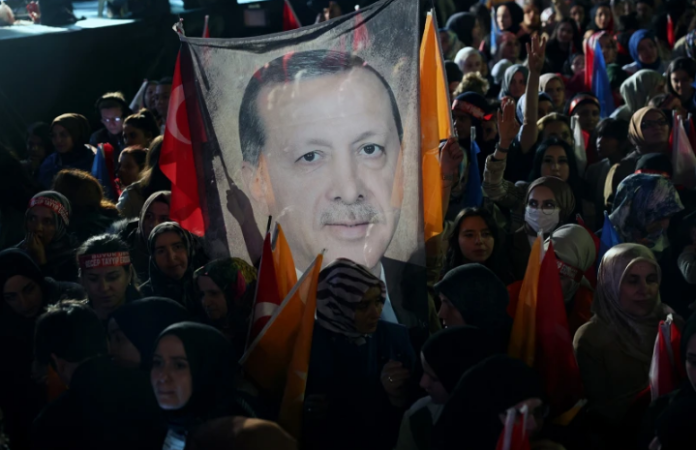DM Monitoring
Istanbul: Turkish President Recep Tayyip Erdogan has won re-election, according to the country’s Supreme Election Council and unofficial da-ta from the state-run Anadolu Agency, in a tense run-off after he failed to secure more than 50 percent of votes required for an outright victory in the first round on May 14.
With almost all of the votes counted, Erdogan received 52.14 percent of votes in the second round on Sunday, beating his challenger, Kemal Kilicdaroglu, who won 47.86 percent, according to the Supreme Election Council.
The result is expected to be confirmed in the coming days. The vote seals Erdogan’s place in history as he extends his 20-year rule for a further five years.
He had already outstripped the 15-year presidency of the Republic of Turkey’s founder, Mustafa Kemal Ataturk. As Erdogan’s victory seemed complete, crowds headed to the presidential palace in Ankara to wait for his celebratory speech. Prior to that, Erdogan appeared outside his residence in Istanbul’s Uskudar, where he sang before thanking an adoring crowd.
“We have completed the second round of the presidential elections with the fa-vour of our people,” Erdogan said. “God willing we will be worthy of your trust as we have been for the last 21 years.”
He added that all 85 million citizens of the country were the “victors” of the two rounds of voting on May 14 and May 28.
The president also said that the main opposition Republican People’s Party (CHP) will hold candidate Kilicdaroglu accountable for his bad performance, adding that the number of the CHP seats in the parliament decreased compared to the 2017 polls.
In his first comments after it became clear that Erdogan would continue as president, Kilicdaroglu said that he would continue what he termed a “struggle for democracy”.
“All the means of the state were mobilised for one political party and laid at the feet of one man,” the CHP leader said. “I would like to thank the heads of the Nation Alliance, their organisations, our voters, and the citizens who protected the ballot boxes and fought against these immoral and unlawful pressures.” Er-dogan repeatedly referred to his opponent as being backed by “terrorists” – due to the support offered by the main pro-Kurdish party – while Kilicdaroglu end-ed the campaign by calling Erdogan a “coward”.
The campaign took on an increasingly nationalist tone, with the opposition
in particular promising to force Syrians and other refugee populations to leave.
Sunday’s run-off vote was the first time since direct presidential elections were introduced in 2014 that the vote had gone to a second stage.
Despite citizens being called to vote again two weeks after May 14’s initial elec-tion, the turnout remained around 85 percent.
For Turks following the opening of ballot boxes on television, the results de-pended on which platform they were following – the state-run Anadolu news agency or the Anka agency, which has ties to the opposition.
Two hours after the polls closed – as the election authority said a quarter of bal-lots had been counted – Anadolu was showing Erdogan leading at 53.7 percent while Anka showed Kilicdaroglu ahead at 50.1 percent.
As the evening wore on, however, the difference between the two accounts nar-rowed and Erdogan was shown ahead in both.
The elections – a parliamentary poll was run alongside the leadership race on May 14 – were widely billed as the most important in recent Turkish history and took place during the centenary year of the republic’s foundation.
The choice between the candidates was portrayed in similarly striking terms – either an extension of Erdogan’s two-decade rule or a leader pledging a return to a parliamentary system.
The polls, in which more than 64 million Turks at home and abroad were enti-tled to vote, took place against a background of a cost-of-living crisis that saw inflation peak at 85 percent in October and earthquakes in February that killed more than 50,000 people in the country’s southeast.
Erdogan, who came to power in 2003, initially as prime minister, offered a vi-sion of further development, promising to extend the improvements made by his Justice and Development Party (AK Party) government.
Following his success in the parliamentary election – the AK Party and its allies won 323 of 600 seats – Erdogan was also able to promise the stability offered by controlling both the legislature and the government.
Kilicdaroglu, meanwhile, pledged democratisation and a rollback of Erdogan’s “one-man rule” while addressing what he called economic mismanagement.




